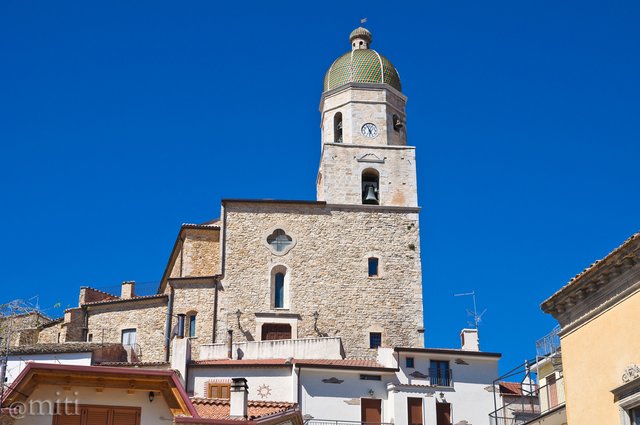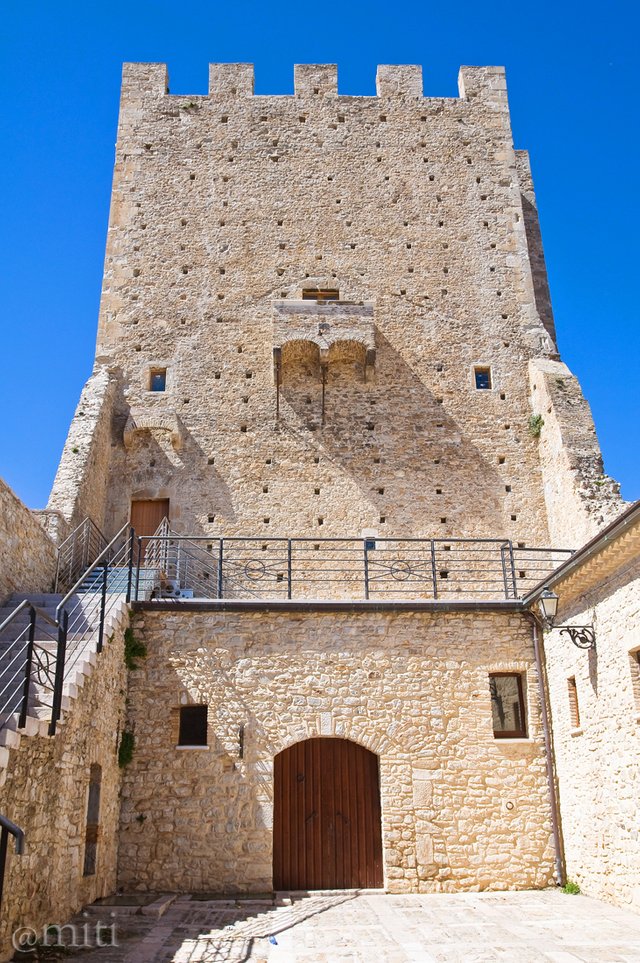A Journey through Italy: one photo every day #118 - PIETRAMONTECORVINO [ENG/ITA]

A panoramic view of Pietramontecorvino (Author's photo - All rights reserved)
Vista panoramica di Pietramontecorvino (Immagine dell'autore - tutti i diritti sono riservati)



Ciao a tutti,
questo è un viaggio attraverso l'Italia. Posterò una foto al giorno con una brevissima descrizione. Spero vi piaccia!

Pietramontecorvino è una piccolo borgo della provincia di Foggia, nella regione italiana meridionale della Puglia. È situato nel mezzo dei monti Dauni, una serie di colline argillose e basse vette tra Fortore e Carapella.
Secondo la tradizione l'origine della città è bizantina e il nome originale era Montecorvino. Nel corso della sua storia, fu fondata dai rifugiati dell'antica Montecorvino, distrutta per la prima volta nel 1137 da Ruggero II, saccheggiata dal re Ladislao nel 1332 e bruciato da Alfonso d'Aragona e infine raso al suolo da un terremoto nel 1456. La popolazione di Montecorvino fondò i tre centri di Motta Montecorvino, Pietramontecorvino e Volturino.
Il nome ufficiale della città, Pietramontecorvino, fu istituito nel 1861.
Il cuore della città è il quartiere di Terra Vecchia, un caratteristico dedalo di stretti vicoli e piazzette ombreggiato dal Palazzo Ducale, una torre normanna-angioina e la Chiesa Madre di Santa Maria Assunta del XII secolo.
Il Palazzo Ducale, costruito nel periodo svevo, presenta un'esposizione di Civiltà contadine nei locali dell'ex carcere. All'interno del Palazzo si trova la chiesa di Santa Maria Assunta del XII secolo; il suo orientamento originale fu modificato nel XVIII secolo quando, nel corso di radicali ristrutturazioni, fu letteralmente invertito.
Della struttura originaria rimangono il portale laterale, con un arco a tre punte, un bassorilievo dell'Agnus Dei e il presbiterio gotico, ora collocato all'ingresso principale della Chiesa. La Loggia, la scala esterna e il portale principale risalgono al XVIII secolo.
All'interno della chiesa, la cappella rinascimentale e un cenotafio, costruito nel 1567 per volontà della famiglia Tinto. L'altare maggiore è in stile barocco mentre il campanile è quadrato e certamente di origine medievale. La cupola, che si erge sopra di essa, è ricoperta di maiolica verde e gialla.
Il centro storico è caratterizzato da strette e contorte, spesso chiuse da cosiddetti "meniali" che servivano a rallentare l'avanzata di eventuali invasori e ha una forma circolare che, in origine, era fortificata da mura e torri.
Delle fortificazioni oggi rimangono le tre porte, Porta di Santa Caterina, Portella e Porta Alta, sulle quali è possibile ancora vedere un grande arco a sesto acuto. Delle antiche fortificazioni rimane anche la Torre Normanna, costituita da una torre merlata quadrata alta più di 30 metri, e una Casa-Torre, unica sopravvissuta di molte che si ergevano lungo le mura.
Il territorio di Pietramontecorvino è infine ricco di aree verdi. Infatti rappresenta una delle zone più belle dei Monti Dauni, nella località denominata Celle, caratterizzata dal sito archeologico di Sant'Onofrio e da due fonti fresche: la "pila del ladro" e "la pila di Sant'Onofrio".
E 'stata premiata con la menzione tra i Borghi più belli d’Italia e la Bandiera Arancione del Touring Club Italiano.
Cose da vedere: Il Centro Storico, la Chiesa Madre di Santa Maria Assunta, la Torre Normanno-Angioina, il Palazzo Ducale, la Chiesa dell'Annunziata, la Chiesa di San Francesco d'Assisi, la Chiesa della Madonna del Rosario, le tre Porte del borgo, la Casa-Torre, il sito archeologico di Sant'Onofrio.

Hello everyone,
I began a Photo Journey through Italy. I will post one photo every day with a little note of explanation. I hope you like it!

Pietramontecorvino is a small town in the province of Foggia, in the southern Italian region of Puglia. It is Situated in the middle of the Daunia mountains, a series of clay hills and low summits between Fortore and Carapella rives.
According to tradition the origin of the town is Byzantine and the original name was Montecorvino. Throughout its history, it was founded by refuges of the ancient Montecorvino, first destroyed in 1137 by Roger II, plundered by king Ladislaw in 1332 and burned by Alphonse of Aragon and finally razed to the ground by an earthquake in 1456. The population of Montecorvino founded the three centers of Motta Montecorvino, Pietramontecorvino and Volturino.
The official name of the town, Pietramontecorvino, was established in 1861.
The heart of the town is the Terra Vecchia quarter, a characteristic maze of narrow alleyways and small squares overshadowed by the Ducal Palace, a Norman-Angevin tower, and the 12th century Mother Church of Santa Maria Assunta.
The Ducal Palace, built in the Swabian period, with an exhibition of Peasants' Civilization in the locals of the former prison. Inside the Palace is the 12 th century Church of Santa Maria Assunta; its original orientation was altered in the 18th century when, in the course of radical renovations, was literally inverted.
Of the original structure remain the side portal, with a triple pointed arch, a bas-relief of the Agnus Dei and the Gothic presbytery, now placed at the main entrance of the Church. The Loggia, the outside staircase and main portal dating back to the 18th century.
Inside the church, the Renaissance Chapel and a Cenotaph, built in 1567 by the will of Tinto family. The high altar is in Baroque style while the Bell Tower is square and certainly of medieval origin. The cupola, that rises above it, is covered with green and yellow majolica.
The old town is characterized by narrow and twistings, often closed by so-called "meniali" that had to slow the advance of any invaders, and has a circular shape which, originally, was fortified by walls and towers.
Of the fortifications today remain the three gates, Porta di Santa Caterina, Portella and Porta Alta, on which we can still see a large pointed arch. Of the ancient fortifications also remain the Norman Tower, consisting of a square embattled tower over 30 metres high, and a Casa-Torre (House-Tower), unique survivor of several that stood along the walls.
The territory of Pietramontecorvino is finally rich of green areas. Here we have one of the most beautiful areas of the Monti Dauni, in the locality called Celle, characterized by the archaeological site of Sant'Onofrio and two fresh sources: the "Stack of the thief" and "stack of Sant'Onofrio".
It was nominated one of the Italy's most beautiful towns and has been awarded the Orange Flag by the Touring Club of Italy.
Thing to see: The Historic Centre, the Mother Church of Santa Maria Assunta, the Norman-Angevin Tower, the Ducal Palace, the Church of Annunziata, the Church of San Francesco d'Assisi, the Church of Madonna del Rosario, the three Gates, the Casa-Torre, the archaeological site of Sant'Onofrio.

| Tipo di foto / Category | Paesaggio / Landscape view |
| Esposizione / Settings | 1/320 sec, ISO 200, f/10 |
| Camera | Nikon D5000 |
| Lente / Lens | Tamron SP 17-50mm f/2.8 XR Di II LD |
| Filtro / Filter | Polarizzatore Hoya / Hoya Polarizing filter |
| Cavalletto / Tripod | Manfrotto MKC3-P01 |
| Località / Location | Pietramontecorvino (Foggia), Italia |
| Software | Photoshop |


The Norman-Angevin Tower (Author's photo - All rights reserved)
La Torre Normanno-Angioina (Immagine dell'autore - tutti i diritti sono riservati)
nice day
Excelente trabajo gracias por compartir...
Slds...
FS
Congratulations, Your Post Has Been Added To The Steemit Worldmap!
Author link: http://steemitworldmap.com?author=miti
Post link: http://steemitworldmap.com?post=a-journey-through-italy-one-photo-every-day-118-pietramontecorvino-eng-ita
Want to have your post on the map too?
Finalmente è nuovamente iniziato il viaggio e sono in prima fila sull'autobus.
Speriamo questo viaggio sia ancora molto lungo!
Ciao, tranquillo... questo viaggio durerà ancora molto a lungo :-)
great update
;-)
Great photos yet again @miti!
What are those holes in the Norman-Angevin Tower for?
Thanks!
Those holes are called Putlog holes or putlock holes.
From wikipedia (source):
Hi @miti , congratulations for photography, every photograph you posted is unique and beautiful.
Thanks for the info. it really nice, waiting for your next post.
Thanks ;-)
You welcome.
Nice post keep it up and wait for more updates from you do follow you thanks
Thanks
Most welcome
Nice Pic
Thank you for sharing info
Nice building,its look is si nice
Posted using Partiko Android
They are very grand indeed.